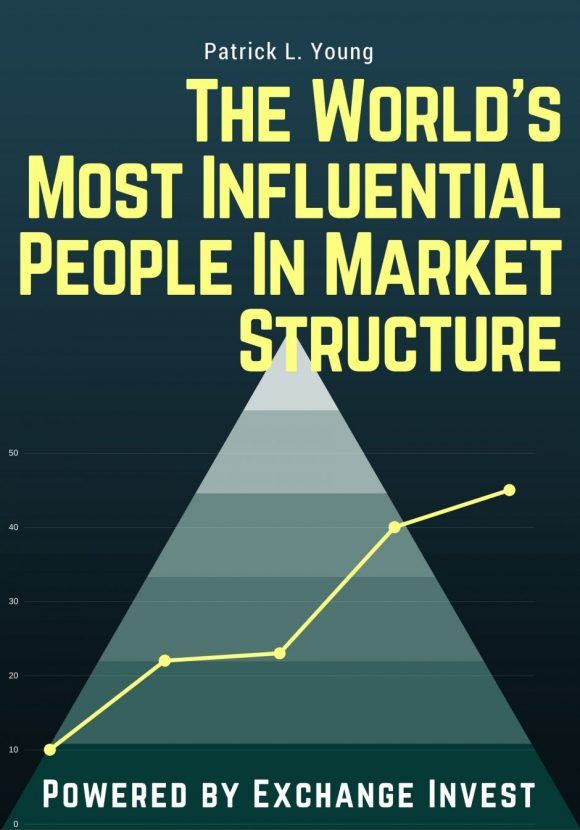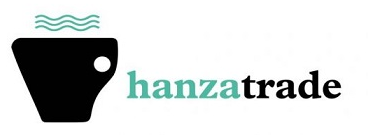Exchange Invest Weekly Podcast 030
Transcript:
Ladies and gentlemen, the Hound of Hounslow avoids jail. He's going to be confined to his kennel instead. There are encouraging NASDAQ results and a new CEO for Oslo Bors. That's perhaps the least shocking news of the year so far. They say life begins here: Welcome to Episode 30 of the Exchange Invest weekly podcast.
It's another curious hybrid of super optimistic weapons grade grumpy snark once again today, but the feedback remains solidly favorable: not necessarily in agreement I hasten to add. But what I am saying, is the whole format of opinions or feedback is welcome as always, whether in relation to the Exchange Invest Daily newsletter or this the Exchange Invest Weekly Podcast. This is Episode 30. My name is Patrick L Young.
...And so on to our top line stories this week. Decent results from Singapore Exchange, their second quarter net profit Rose 2.6%. Perhaps most interestingly, they are buying an Index Provider for $206 million: Scientific Beta PTE.
No acquisitions from Japan Exchange Group, they produced some solid consolidated results for the nine months ended December 31. Meanwhile, NASDAQ profits: they topped Wall Street's estimates on the non trading unit strength with a declared dividend of 47 cents per share. NASDAQ beats estimates thanks to earnings beyond pure exchange listing and trading. But it keeps being referred to as ‘non core’ by the media: leads me to wonder just when Nasdaq’s core will not be its core, or vice versa, as clearly the Adena Friedman era is reshaping the behemoth Bob built for a new generation of growth.
Finally on results for this week, the Dar es Salaam Stock Exchange, their profits plunged after a historic sale of Voda shares.
Hong Kong is open as usual for business as I speak to you at the end of a wondrous week in markets. But at the same point in time, China is not going to be open until Monday 3rd February, a post festive reopening day pushed back as a result of Coronavirus. Some of the media have been fallaciously suggesting China is trying to reduce risk to stock market prices. Whereas, it looks more to me like a common sense move restricting the commodity exchanges as well as the stock exchanges and thus reducing movement over what then becomes a long weekend, hopefully helping to contain the Coronavirus outbreak.
Over at the National Stock Exchange of India, institutions are rushing to sell their shares as unfortunately, the uncertainty prevails over whether there will ever be a listing of the National Stock Exchange of India's shares given Sebi’s ability to seemingly find something buried under the carpet every time an IPO is mentioned. You know, readers, it's the year 2020. I mean, I'm just reiterating that in case you feel locked into a form of NSE IPO centric Groundhog Day because this could be more or less anytime during the past decade.
Our second story this week concerns Brexit. By the time you listen to this podcast, Britain, the United Kingdom of Great Britain and Northern Ireland will have left the European Union after 47 years, having joined the European Economic Community, and then subsequently discovered that what came after it, which was the urge for a European super state didn't actually gel with the British people's idea of what they signed up for in the first place.
This week, there have been a series of stories. Academics were in the House of Lords this week, and talking to parliamentarians, Brexit could mean a 5 billion pound shortage of taxes. That tax loss seems to be imputed from the usual ‘take everything that's possibly disastrous throw it into a pot and don't allow for too much good news.’ Actually, at least one of the academics was speaking to this panel of parliamentarians in the House of Lords the other day. I did mention the fact that there would probably be some sort of substitution effect. Hooray. We're almost seeing pragmatism over Brexit at last. I actually reckon there is a kind of Brexit Laffer curve out there as yet undiscovered. Maybe it's my curve, the Young curve of Brexit, who knows, but into a void of hate, horror and all negativity on the part of a certain proportion of the British community, citizens with no foresight and little perspective, it has to be said over the course of events during the past three to five years. The sheer opportunity for Britain sheared of the European Union's anti commercial bias will bring benefits, hence the concept of the Young Brexit (Laffer) curve. Yes indeed expect rough seas at first then gradually it will all become obvious what has happened - except to those who drove themselves demented with a misplaced Europhilia. Here we see the usual types of academia demonstrating just why financial, academia, with a few very bright exceptions, is not particularly worthy of our support, especially not at those levels of fees! I mean, if we think financial data is expensive, and apparently all the banks do, MBA courses are surely highway robbery? Indeed, at least in the digital age, you can still profit from what they perceive to be high cost digital data.
The key takeaway is that Reuters have distinguished themselves with factual reporting in the Brexit arena, something alas, essentially none of their media peers and the legacy press can lay claim to. Unfortunately, there is now going to be a dirty war from the establishment, which remains myopically Europhile, which is utterly self defeating for the UK’s prospects. The trade negotiations are all the UK will be negotiating soon with the USA, with the European Union indeed if they want to come to their senses, and indeed hopefully also Commonwealth nations such as New Zealand, Australia and Canada. Great prospects are ahead. At the same time the industry and financial markets have been setting out visions for post Brexit financial regulation. The latest was a report from the International regulatory Strategy Group and Linklaters the law firm, discussing changes that they seek to enhance the UK financial regulatory architecture to meet the challenges and opportunities arising from Brexit itself. At the same time, there was an excellent story in Reuters last week, the UK finance sector is ready to waive the Brexit white flag amid ‘fish for finance’ talk. Essentially, according to the excellent Huw Jones of Reuters, “Britain's finance sector is losing hope of securing even basic access to EU markets from December the 31st. As talks that the EU wants UK fishing rights in exchange draws the industry into a political struggle. Between the block and its departing member.” Peter Lilley, an esteemed former UK parliamentarian who now sits in the House of Lords, the upper chamber: “London is a marketplace. The marketplace doesn't come to them. [i.e. the EU], the health of the city doesn't depend nearly to the extent that is believed on having some privileged position in the EU.” Hear! Hear! I say. Of course, this is the irony of the whole Brexit situation. The City of London, thanks to its elite masters is probably going to pay for its short sighted pro EU stance. Remember, the City Corporation distressed itself through a unanimous vote for EU membership sometime back when the referendum was looming. While a whole host of bailout chickens have not come home to roost in the banking sector. The irony is of course that Brexit will make the city better off in the medium to long term. Banks are closeted and customer oblivious. There is a widespread ignorance of how feathered the financier's nest is from the city's self interested souls. Hence a dose of sensible shock treatment from a government that seeks to reorient trade and they seek to reorient the economy of the United Kingdom.
Reorienting that trade will soon enough whet the palates of the financially motivated when they get over their daft myopic obsession with less than 15% of the world's trade, which is what remains in the rump of the 27 nation EU as of this weekend. And once Britain's finances get together and look at the 85% plus of the world's economy to which Britain is now a closer part by the time you listen to this. The opportunities are enormous, cue in the opportunity to help finance a better policy for the regions of the United Kingdom and the opportunities for the City of London look brighter than ever. If only many depressed souls at the top of the City of London had the ability to see outside the box of their own making.
Equally, the UK’s watchdog the FCA was telling markets “be ready in case of No EU trade deal.” It's certainly interesting I mean, looking at the dynamics to Brexit ever since Britain had an outbreak of government after the chillaxing Cameron and the inexorably incompetent Mrs. May: The UK has huge optionality. As I noted earlier, the opportunity to negotiate trade deals is now upon us with the USA, Canada, Australia, New Zealand the rest of the Commonwealth at al: 85% of the world's economy. Meanwhile, the EU has spent the past month, the first month of 2020 in a huff lobbing what few toys remain in its pram, across the channel. The result is the UK preparing for the worst, when they might, just might, be able to manage a welter of trade deals, either with the UK or others. Well, suddenly some folks in Brussels and indeed even the Dutch Prime Minister are saying a deal may yet be possible before the year end. The risk in these circumstances to the UK of course are the booby traps left behind by the pipe bomb of incoherent defeatism, which was the May negotiation for Brexit itself, that still underpins all too much of what is the first stab at Brexit, which is coming into effect as I record this podcast. or, indeed, one could refer the current Brexit outline via the May cum Boris amended agreement in the parlance of Belfast street speak: “Brexit right now is better than a dig in the head.”
Over in central Eastern Europe a degree of cooperation this week: the Budapest Stock Exchange and the Vienna Stock Exchange are going to extend their cooperation until 2026. Looking back on already 15 years of successful cooperation, covering the provision of trading system services, market data distribution and the calculation of stock indices.
No Exchange Invest Weekly Podcast these days would be complete without discussion of Libor. The UK watchdog the FCA has clarified the Libor stay of execution. Hmm. It's a curious clarification. “Publication of Libor interest rates,” according to Reuters, “that have become unreliable would be allowed for months but not years to ensure an orderly succession. Britain's FCA has said.” And as Reuters notes, “ratcheting up the pressure to ditch the tarnished benchmark.” Gosh, it all sounds a bit like weights and measures, doesn't it and the metric -cation that the UK had to undergo in order to manage to be part of the European Union? Will there ultimately be little cabals of old lags meeting in city basements underneath bars musing on Libor rates and calculating them themselves from little snippets of paper script from dealers they know?
Meanwhile, a report from Duff & Phelps, the consultants: they found that in a survey of various people that they surveyed, New York was “surging ahead of Brexit-shadowed London in finance.” As always, a simple Maxim applies here: consultants never issue reports which say things are hunky dory, as that means they may not be able to garner business through fearmonger marketing. The beloved tactics of far too many large entities, alas. Second, just as any survey of sheep at this time of the year sees 100% optimism they will be gamboling in the fields through summer with all four legs intact, and not a trace of mint sauce in sight...So too, turkeys on either side of the Atlantic deployed unanimity that they will enjoy the entirety of December gobbling along without a care in the world. Given financiers rarely ever foresee anything in collective studies remotely accurately, the good thing about this pessimism over the London financial center is in fact opportunity and potential, especially for parishioners. Mark my words, the roaring 20s will end with London still a major player. At the same time looking back to Davos, which looks ‘Oh, so last week,’ - well, doesn't it always? - but actually, physically, it was also last week as I'm recording this. Interesting to note there that CEOs were hugely optimistic. That's a big worry. Usually when they're hugely optimistic the world's going to fall apart. I have to hope that's not true of the NYSE and NASDAQ folks who are very optimistic about the pipeline of IPOs. Although hopefully, they can actually see the pipeline of IPOs rather than in the case of CEOs at Davos, just looking out onto the snowy uplands of Switzerland with a glass of champagne and some expensive canapes in their hand and thinking well, ’life does look rosy.’
In the third story for the Financial Conduct Authority of the UK this week, they issued a white paper “quantifying the high frequency trading arms race, a simple new methodology and estimates.” Now look, ladies and gentlemen, I love science. I love scientific method, and I occasionally wonder just how mind bogglingly stupid quant mathematicians, amongst other scientists, can be. Extrapolation can be a useful tool, but it's also an enemy of extending logic. Here we have an example which, while not wholesale stupidity, rather, is a valid attempt at promoting understanding. Nonetheless, it comes up with a conclusion, which can be head nodded along with in classic somnolent NED fashion until anybody actually pays heed to the quantum hoops being jumped through.
Oh and for those who loathe HFT in every vestige, please park those complaints for another day, this is not the issue with my analytical gripe here.
This paper has been read with interest by all manner of folks who watch a lot more message data than I. But it's not difficult to see the ultimate flaw in this research. The current baby steps of quantum analysis by financial regulators makes them feel obliged to identify some definitive amount of money which it is costing everybody so we can all go ‘tsk tsk and thank the Lord we have benign regulators trying to save us from the evils of something’ at which stage the entire regulatory blob of course, fails to notice the sale of live koalas and snakes in unsanitary conditions, so Wuhan bat disease threatens to kill us all.
Anyway, while my eyes initially glazed over at the prospect of this paper, it's actually not bad. The problem is that measuring the impact of HFT traders who pick off resting orders cannot be done in a vacuum. In complex markets, everything is interrelated, and thus it's impossible to discern. However, here, the ‘Tefal heads’ state, with what I believe is hubristic, to coin a phrase “quantfidence.” “Our main estimates suggest that eliminating latency arbitrage would reduce the cost of trading by 17%. And that the total sums at stake are on the order of $5 billion annually in global equity markets.” I'm reminded of that line in The Hitchhiker's Guide to the Galaxy, “at which point man says that was easy and goes on to prove black equals white and gets run over at the next zebra crossing.” I mean, Whoa, there fellows! As one Exchange Invest reader noted this week, “if the latency ARB HFTs did not exist. What would be the impact? eg how much trading would have occurred? and at what price?
Nobody knows, and nobody can know. So I don't think these numbers should be viewed as cost unless you can reliably describe the alternative scenario. True, the authors tried to give us an old verse view with periodic batch auctions, etc. But that is again a solution conjured up in a vacuum, which will have all manner of effects on the other market participants.” In other words, it's like saying, ‘if we took all the commercial lorries off the road that would be less congestion and roads would last longer.’ The problem of course, being that by week four of this experiment, the otherwise largely untraveled tarmac would be seeing 10% less cars on the road as they awaited parts for their repair, another 10% of drivers would be unemployed; so therefore not commuting because they couldn't get business supplies. And meanwhile, folks would be starving in the shires because nobody could get their food deliveries. True, we would reduce congestion, but there would be no economy worth speaking of. Some may say this is also known as the Bernie Sanders effect.
I'm a huge advocate for alternative market models and considerations therein. I love the notion of block trading as well as open live markets. However, opportunity cost and execution of trades is a highly complex ecosystem of optionality, derived from all manner of folks being in the market with different approaches. Simply removing sniping HFT without considering the ecosystem is akin to how illogical eco extremists stopped Australia back burning their forests and look at where that got civilization.
In people news this week #zeroshock event there was the parish CEO who effectively never was: Håvard S. Abrahamsen is standing dawn having been on gardening leave awaiting his new role as CEO of Oslo Bors when the stealth raid on that exchange’s shares by Euronext began before Christmas 2018 in time honored Euronext fashion. The next tier down provides the new CEO in this case Øivind Amundsen, head of Norwegian listings and with Oslo Bors since 2010.
Elsewhere, the only slightly notable jobs news of the week was the fact that Carsten “Carcrash” Kengeter, the disgraced former boss of Deutsche Boerse, who after all, left under a shadow and indeed was accused of insider dealing...Ultimately, one might argue that the German authorities pulled their punches on that one. He's now become a non executive director of a wealth manager. Hmm quite remarkable what next Navinder Sarao for head of risk management?
And that brings us neatly to the Hound of Hounslow who has been sentenced to house arrest. The autistic Mr. Sarao, who did so much in order to manage to well, pervert the course of the CMEs rulebook, ultimately provided huge amounts of cooperation, pledged to provide in his plea deal that he would never do anything wrong again. And indeed, ultimately, and thankfully, we have seen some degree of regulatory and legal pragmatism in the United States which means he will not be ultimately sentenced to jail. Indeed, that could be the luckiest trade ever for Navinder Sarao as he was likely facing one of those 700,000 lifetime-style sentences, the US loves overindulging the criminal fraternity with.
Meanwhile, in regulation itself, Canadian securities regulators have provided an update on their trading fee rebate pilot study. For those who haven't given up in despair about what happens south of the Canadian border, aka US equity trading, or like me, you've adopted a position not dissimilar to the third reel of the wicker man, albeit supplied without the inherent sexism of the original burn. There might be some stuff in this Canadian study which can be used to justify tinkering with the US equity system.
Over in Europe. Well MIFID II: even the AMF, the French regulator have ultimately given a degree of long standing consideration to MIFID II and come out and said, well, parts of it are basically rubbish. If the AMF takes their time to publish a report damning elements of MIFID II, their accuracy needs to be accorded serious consideration by the many dolts who constructed this shambolic piece of legislation. Indeed, when it comes to MIFID II, the equivalent best seller for financial regulation will probably never eventuate whereas “When Genius Failed,” author Roger Lowenstein had a catchy title to the pointy hats missing the tiny flaws and academia's perceived Earth perfection when discussing the LTCM hedge fund disaster... the EU sales prospects for a similarly titled book, presumably “When Stupidity Failed”, are probably low, even if it would be an ideal title for the flawed hotchpotch of naked interventionist drivel, which is the execrable MIFID II.
Two good stories in technology this week:
Interactive Brokers, they're creating a separate vendor arm to consolidate their data operations; that makes them an instant data powerhouse business.
Elsewhere Airbus: Well, we heard about it last year; they're launching a new futures market related to the pricing of air tickets and very exciting Skytra is going to be too ...and that's going to be powered with the help of NASDAQ technology, unsurprising in many ways that Airbus chose that 500 pound gorilla vendor. But then, think again ladies and gentlemen true NASDAQ does have a major operation in Sweden. But isn't it remarkable that Airbus, which has major shareholders in France and Germany didn't pick either Euronext or Deutsche Boerse for the deal? Yes, on second thoughts. I've been pondering that too.
In product news, last week, we heard about the Bombay Stock Exchange, potentially wanting to list a futures contract on Brent crude. It seems to me to be full of many different foibles, particularly the fact that it's going to be Rupee priced and therefore have no interest to the rest of the world. But at least they're going to have a fundamentally sound benchmark for the settlement because they've signed a licensing agreement with Intercontinental Exchange to use their Brent Crude settlement prices for the new futures marketplace.
Bit of a shake up for JSE, the Johannesburg Stock Exchange. South African Sasol: they're planning a secondary listing on the upstart competitor platform A2X. Given how Sasol was built on processing coal to oil and a kind of inverse frack during the sanctions era, the word seismic may be appropriate that this stock is endorsing one of the Indian challenger markets against the behemoth incumbent of JSE.
Interesting, Brazil's Petrobras. They're asking to exit the B3, the Brazilian Stock Exchange’s Good Governance Program. It's a worry on the macro not just in Brazil, because it appears Petrobras is worried about political interference applying pressure to its attempts at good corporate governance. And all the airy whiter than white folk from various parties; usually naive folk or politicians who can't be naive folk Surely, the simple truth of good corporate governance meeting Realpolitik is that the politicians generally don't bend unless or until the ballot box throws them out. Albeit if conditions are suitably extreme, and it looks as if the people might be well, you know, rioting in the streets, rebelling throwing petrol bombs when they can get enough petrol, etc. the politicians will then throw out all of their long eschewed principles to keep themselves in office. QV news this week from Bloomberg, in crisis ridden Venezuela - the socialist paradise Don't forget - might actually look at privatizing the National Oil monopoly PDV sa. One thing we can say for certain: I don't expect to see any American bidders for the Venezuelan oil monopoly.
One piece of crowdfunding is a particular interest. In Korea they're going to limit peer to peer lending to individuals up to $42500 USD and slightly less for real estate backed financial products.
And on that note, ladies and gentlemen, well it's the end of an era, not the end in so far as the Brexit era but of course, Brexit has begun Ladies and gentlemen, the UK is working its way towards freedom from the European Union's political project that makes Britain still very much a part of Europe, just not a part of the EU. However, it's the end of an era looking back two generations. Rest in peace, Hurricane pilot, Wing Commander Paul Farnes, the last surviving fighter ace of the Battle of Britain. Several other great heroes of the Battle of Britain have died in recent times Wing Commander Tom Neil, was 97. He died last year as did Squadron Leader Geoffrey Wellum aged 96. Indeed during the course of December last year alone, Flight Lieutenants Ronald Mackay and Maurice Mounsdon both 101 passed away. The great Polish ace of the Battle of Britain, Franciszek Kornicki, died in 2017. There were 3000 pilots of “the few” who fought tirelessly in the Battle of Britain. Only two remain with us today, Flight Lieutenant William Clark and Flying Officer John Hemingway, both of whom received their telegrams from the Queen on reaching 100 years of age last year.
“Never in the field of human conflict was so much owed by so many to so few” noted Winston Churchill in one of his most brilliant statements.
We commend those pilots from the Commonwealth and beyond who took to the skies wildly outnumbered, and prevailed in an epic air battle to secure the future freedom of not just the United Kingdom but Europe as a whole, I cannot conceive of their bravery from my current post behind a laptop holding a microphone. However, back to Wing Commander Farnes who died just this week, age 101. Last year, he discussed the utter shambles of air combat with the BBC and noted: "You shouldn't say it, but I thoroughly enjoyed it, I think most of the chaps enjoyed it. After all, a lot of us were volunteer reserves, we joined to fly and here we were flying one of the best aircraft as many times a day, more or less, as you could wish for. It was good fun."
Ladies and gentlemen. The United Kingdom remains part of Europe. It just isn't part of the European Union.
Nowadays, of course, life is much better fun. The most dangerous thing you can do in a week well, it's probably not listening to the Exchange, Invest Weekly Podcast but some say it may be right up there in terms of politically incorrect thinking. Thanks very much for your time ladies and gentlemen have a great weekin markets.
Links
Singapore Exchange 2Q Net Profit Rose 2.6%
Morningstar.com
Singapore Exchange Buys Index Provider For $206
Reuters
Nasdaq Profit Tops Wall Street Estimates On Non-Trading Units Strength
Nasdaq
Nasdaq Inc (Ndaq) Q4 2019 Earnings Call Transcript
Nasdaq
Dar Es Salaam Stock Exchange Profit Plunges After Historic Sale Of Voda Shares
The Citizen Daily
Hong Kong Markets To Open As Normal As Regulators, Government, Banks Prep Contingency Plans
Yahoo Singapore News
Institutions Rush To Sell NSE Shares As Listing Uncertainty Prevails
BloombergQuint
Brexit Could Mean £5 Billion Tax Loss From Finance - Academic
Reuters
Industry Sets Out Vision For Post-Brexit Financial Regulation
Linklaters
UK Finance Sector Ready To Wave Brexit White Flag Amid 'Fish For Finance' Talk
Reuters
UK Watchdog Tells Markets: Be Ready In Case Of No EU Trade Deal
Budapest Stock Exchange And Vienna Stock Exchange To Extend Cooperation Until 2026
Wiener Boerse
UK Watchdog Clarifies Libor Stay-Of-Execution
Reuters
New York Surges Ahead Of Brexit-shadowed London In Finance: Survey
Reuters
Quantifying the High-Frequency Trading “Arms Race”: A Simple New Methodology and Estimates
FCA
Hound of Hounslow Sentenced to House Arrest
Yahoo News
Canadian Securities Regulators Provide Update On Trading Fee Rebate Pilot Study
Exchanges Lose Ground As Mifid II Fails To Move Trades From Dark To Light
Financial News
France's Financial Watchdog Looks To Revive Declining Research Market Under Mifid II
The TRADE News
Airbus Selects Nasdaq Technology For New Skytra Air Travel Price Derivatives Marketplace
Learn How Airbus’ Skytra, With The Help Of Nasdaq Technology,
Nasdaq
Interactive Brokers Creates Vendor Arm To Consolidate Data Ops
www.waterstechnology.com
Launch Party: US Exchanges Expect IPO Flurry To Start Year
Forbes
Bombay Stock Exchange Inks Licensing Agreement With Intercontinental Exchange To Use Brent Crude Settlement For New Futures
BloombergQuint
BSE Signs Licensing Agreement With ICE Futures Europe
The Hindu BusinessLine
South Africa's Sasol Plans Secondary Listing On A2X
Nasdaq
Brazil's Petrobras Asks To Exit Stock Exchange's Good Governance Program
Nasdaq
Crisis ridden Venezuela might privatize the national oil monopoly PDVSA).
Bloomberg









Member discussion